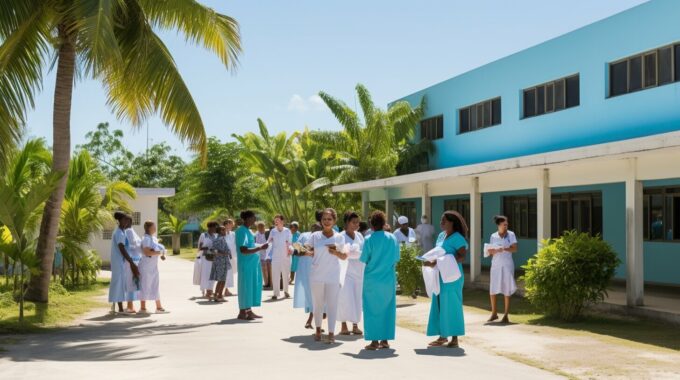At the forefront of property financing in Costa Rica, GapInvestments.com stands as a beacon for…

Understanding Childbirth and Maternity in Costa Rica: A Comprehensive Guide
Childbirth and maternity in Costa Rica offer a range of options and services to expectant mothers, providing comprehensive care throughout the journey of pregnancy, birth, and beyond. Whether you are a first-time mother or have experienced childbirth before, Costa Rica has numerous birthing options, quality maternity care, and access to prenatal and postnatal services tailored to meet your needs.
In Costa Rica, the majority of births take place in hospitals with home births being relatively uncommon. Pregnant women have access to a range of prenatal care services, including regular check-ups with an obstetrician or midwife, ultrasounds, and educational resources. Private hospitals and public hospitals offer obstetric care, with the quality of care varying across regions and hospitals. Births need to be registered with the Civil Registry within 30 days, and the process involves obtaining a birth certificate, filling out a registration form, and paying a fee. Abortion is illegal in Costa Rica under most circumstances, with limited access to abortion services even in cases where it is legal.
Key Takeaways:
- Costa Rica offers a variety of birthing options, with most births occurring in hospitals.
- Pregnant women in Costa Rica have access to comprehensive prenatal care services.
- The quality of maternity care may vary between private and public hospitals.
- Births in Costa Rica must be registered with the Civil Registry within 30 days.
- Abortion is generally illegal in Costa Rica, with limited accessibility even in legal cases.
Maternity Hospitals and Care in Costa Rica
Costa Rica offers a variety of maternity hospitals and care services, ensuring expectant mothers have access to quality care and support during their childbirth experience. Whether you choose a private hospital or a public hospital, you can expect a high standard of medical care and professional staff dedicated to the well-being of both mother and baby.
Private maternity hospitals in Costa Rica provide luxurious accommodations and personalized care for expectant mothers. These hospitals often offer a range of amenities, such as private birthing rooms, comfortable beds, and gourmet meals for the mother. Private hospitals also have well-equipped neonatal intensive care units (NICUs) to handle any complications that may arise during or after childbirth.
On the other hand, public hospitals in Costa Rica provide affordable and accessible maternity care for women from all walks of life. Although the facilities may not be as luxurious as private hospitals, public hospitals have experienced medical professionals who are skilled in handling various childbirth scenarios. These hospitals have well-established protocols and resources to ensure a safe and successful delivery.
It is important to note that Costa Rica has embraced natural childbirth, and many hospitals offer alternative birthing options such as water births or the use of birthing balls. These options allow women to have a more comfortable and empowering childbirth experience. However, it is advisable to discuss your preferences with your healthcare provider to ensure that the chosen hospital can accommodate your specific birthing plan.
| Hospital Name | Location | Services |
|---|---|---|
| Santa Ana Hospital | Santa Ana | Obstetric care, NICU, water births |
| CIMA San José | San José | Private rooms, gourmet meals, natural childbirth options |
| Hospital Mexico | San José | Public hospital, affordable care, experienced staff |
When choosing a maternity hospital in Costa Rica, consider factors such as location, reputation, and the specific services and amenities that are important to you. It is also recommended to tour the hospital beforehand to get a sense of the environment and meet the healthcare providers who will be assisting you during your childbirth journey.

Conclusion
Childbirth and maternity services in Costa Rica offer a comprehensive and supportive environment for expectant mothers, ensuring a safe and positive experience throughout pregnancy, childbirth, and the postnatal period. In Costa Rica, the majority of births take place in hospitals, with home births being relatively uncommon. Pregnant women have access to a range of prenatal care services, including regular check-ups with an obstetrician or midwife, ultrasounds, and educational resources.
Private hospitals and public hospitals in Costa Rica provide obstetric care, although the quality of care can vary across regions and hospitals. It is important for expectant mothers to carefully consider their options and choose a healthcare facility that meets their needs. Births in Costa Rica need to be registered with the Civil Registry within 30 days, involving the process of obtaining a birth certificate, filling out a registration form, and paying a fee.
It is worth noting that abortion is illegal in Costa Rica under most circumstances, and there is limited access to abortion services even in cases where it is legal. As such, expectant mothers should be aware of the legal restrictions surrounding abortion and seek appropriate advice and support if needed.
Overall, Costa Rica provides a range of services and resources to support expectant mothers throughout their pregnancy journey. Whether choosing public or private healthcare facilities, women can find comprehensive care and guidance, making Costa Rica a favorable destination for childbirth and maternity services.
FAQ
Q: What are the options for childbirth in Costa Rica?
A: The majority of births in Costa Rica take place in hospitals, with home births being relatively uncommon.
Q: What prenatal care services are available in Costa Rica?
A: Pregnant women have access to a range of prenatal care services, including regular check-ups with an obstetrician or midwife, ultrasounds, and educational resources.
Q: Does the quality of obstetric care vary in Costa Rica?
A: Private hospitals and public hospitals offer obstetric care, with the quality of care varying across regions and hospitals.
Q: How do I register the birth of my child in Costa Rica?
A: Births need to be registered with the Civil Registry within 30 days. The process involves obtaining a birth certificate, filling out a registration form, and paying a fee.
Q: Is abortion legal in Costa Rica?
A: Abortion is illegal in Costa Rica under most circumstances, with limited access to abortion services even in cases where it is legal.


